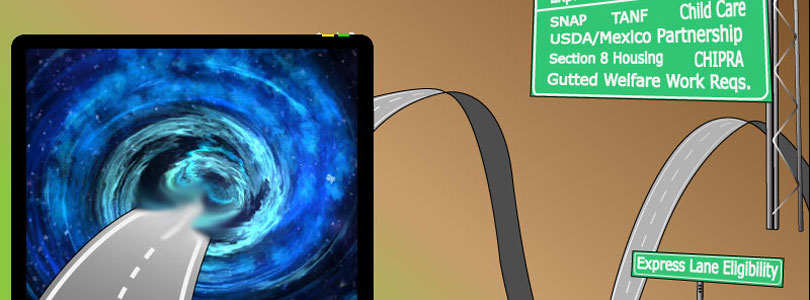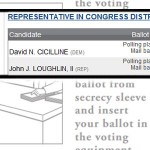Pieces in Place for Dependency Portal with Health Exchange Board Members
Take a close look at who sits on the board for state health benefit exchange, which organizations they are connected with, and the constituencies they represent.
If there are any remaining doubts that Gov. Lincoln Chafee’s administration intends to convert the exchange into a “dependency portal,” those doubts can arguably be expunged on the basis of the board’s membership.
The Economic Progress Institute (EPI), for instance, is intent upon streamlining the delivery of various government benefits. In this year’s legislative session, EPI advanced bills in the House and Senate designed to remove administrative hurdles that make it more difficult for eligible residents to take part in the Rhode Island Works program, which offers cash assistance, health care, and job training services to low income people with children.
Since 2008, the EPI has been working to reverse policy changes that, the group says, “ended the safety net for children.” The lifetime limit was curtailed from 60 months to 48 months, and recipients could only receive benefits for 24 months at a time.
“Having two time limits is confusing for both staff and families,” EPI claims. “The 24 month time limit does not provide enough time for some families to become self sufficient, especially in this weak economy. While families can continue to receive benefits through a “hardship” extension, this is an inefficient and cumbersome way to provide assistance, requiring staff to process paperwork instead of helping families.”
While the EPI fell short of its legislative goals earlier this year, it will be ideally positioned to expand the reach of government social services come 2014 when the exchange system goes into effect as part of the Patient Protection and Affordable Care Act (PPACA).
Beginning in October 2013, individuals and small businesses in Rhode Island can begin reviewing federally subsidized health care options offered through the exchange system. States are required to have the exchanges up and running by January 2014, although some governors are resisting implementation.
Some policy analysts have likened exchanges to Web sites such as Travelocity or Orbitz on which consumers would purchase health plans instead of travel. The federal health law does not require individuals to access health plans through the exchange.
But if the PPACA, otherwise known as ObamaCare, remains in effect, the exchanges could over time drive private insurers out of the market, Michael Cannon, a health care policy analyst with the free market CATO Institute, has warned. Once the exchanges are in place, they will offer health plans that are cheaper thanks to federal subsidies. From a business standpoint, it will make sense for employers to pay the annual $2,000 penalty instead of offering health care as an employee benefit. This means employees will ultimately be forced onto the exchange system.
In Rhode Island, residents who had no intention of accessing government benefits will be plugged into a “unified infrastructure” that offers “one-stop shopping” not just for health care, but for a range of social services such as food stamps and TANF (Temporary Assistance for Needy Families).
This where EPI and other board members such as Progresso Latino and UFCW Local 328 come into play. They all represent constituencies that lobby in favor of government benefits. The EPI’s “Guide to Assistance,” for example, offers up a detailed list of all the government assistance programs available to residents. Rhode Island officials who are ambitious to interlink health care with other social services could incorporate EPI’s Guide into the exchange.
“The Guide provides information about government assistance programs and community-based resources that help low-and-modest income Rhode Islanders to meet basic needs,” the EPI explains on its Web site. “The Guide provides a general overview, eligibility rules, and application information for each program in the areas of Income Supports, Food Assistance, Health Care, Child Care, Housing, Utilities and Tax Credits.”
Once Rhode Island moves beyond the initial phase of implementation, it may be possible to incorporate features into the exchange that are similar to RI.Gov, a state government Web site that enables residents to access multiple services, Jennifer Wood, chief of staff to Lt. Gov. Elizabeth Roberts, has said.
Yet, she insists “there is nothing unique” about Rhode Island’s approach to the exchange system.
The Rhode Island Center for Freedom and Prosperity disagrees.
The state is actually “leading the nation in the advancement of a larger entitlement culture” by way of expanding government services through the exchange system under the guise of health care, the Center argues in a policy brief.
“When collecting detailed personal financial and household information from individuals seeking health insurance support, the state intends to be the first to proactively enroll participants in other state programs for which they are eligible,” the brief says. The creation of a “dependency portal” is the “not-so-hidden goal of Rhode Island’s version of the health benefits exchanges,” the Center claims.
A key part of the strategy here is built around the concept of “express lane eligibility,” which has been incorporated into the Children’s Health Insurance Program (CHIP). The idea is to allow for data to be drawn from a variety of means-tested programs and government databases in an effort to speed up eligibility for both Medicaid and CHIP.



